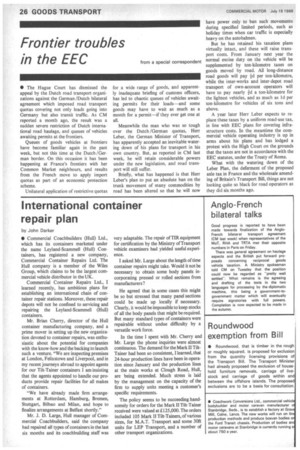Frontier troubles in the EEC
Page 28

If you've noticed an error in this article please click here to report it so we can fix it.
from a special correspondent • The Hague Court has dismissed the appeal by the Dutch road transport organizations against the German /Dutch bilateral agreement which imposed road transport quotas covering not only loads going into Germany but also transit traffic. As CM reported a month ago, the result was a sudden severe restriction of Dutch international road haulage, and queues of vehicles awaiting permits at the frontiers.
Queues of goods vehicles at frontiers have become familiar again in the past week, but not this time at the Dutch /German border. On this occasion it has been happening at France's frontiers with her Common Market neighbours, and results from the French move to apply import quotas as part of an economic protection scheme.
Unilateral application of restrictive quotas for a wide range of goods, and apparently inadequate briefing of customs officers, has led to chaotic queues of vehicles awaiting permits for their loads—and some goods may have to wait as much as a month for a permit—if they ever get one at all.
Meanwhile the man who was so tough over the Dutch /German quotas, Herr Leber, the German Minister of Transport, has apparently accepted an inevitable watering down of his plans for transport in his own country. But, as reported in CM last week, he will retain considerable powers under the new legislation, and road transport will still suffer.
Briefly, what has happened is that Herr Leber's plan to put an absolute ban on the trunk movement of many commodities by road has been altered so that he will now have power only to ban such movements during specified limited periods, such as holiday times when car traffic is especially heavy on the autobahnen.
But he has retained his taxation plans virtually intact, and these will raise transport costs. From January next year the normal excise duty on the vehicle will be supplemented by ton-kilometre taxes on goods moved by road. All long-distance road goods will pay +d per ton-kilometre, while the inter-works and inter-depot road transport of own-account operators will have to pay nearly +d a ton-kilometre for the lightest vehicles, and as much as ld per ton-kilometre for vehicles of six tons and above.
A year later Herr Leber expects to replace these taxes by a uniform road-use tax, in line with EEC plans for covering infrastructure costs. In the meantime the commercial vehicle operating industry is up in arms about his plans and has lodged a protest with the High Court on the grounds that the taxes are not in accordance with the EEC statutes, under the Treaty of Rome.
What with the watering down of the Leber Plan, the deferment of the proposed axle tax in France and the wholesale amending of Britain's Transport Bill, things are not looking quite so black for road operators as they did six months ago.




















































































































